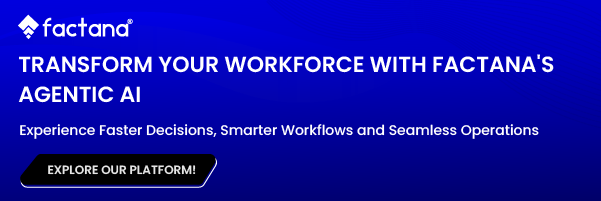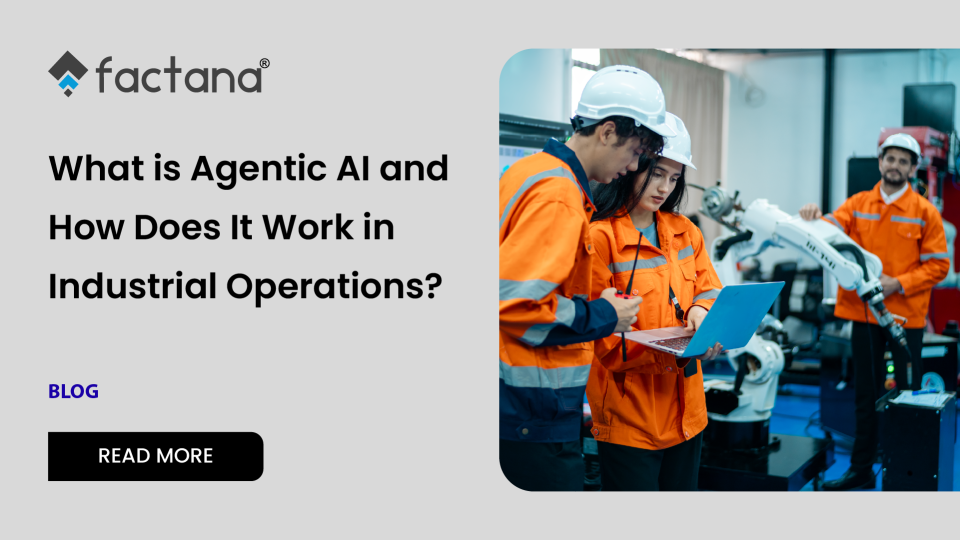What is Agentic AI?
Imagine a factory floor where an AI doesn’t just follow instructions, it notices a machine’s vibration is off, orders a replacement bearing, schedules a technician, and adjusts production so deadlines are still met. That’s Agentic AI: autonomous AI systems that sense their environment, make decisions, and take action without waiting for human prompts.
Unlike traditional AI, which reacts only when asked, Agentic AI acts like a capable co-worker, planning, adapting to changes, and collaborating with both humans and other AI agents.
In industrial settings, this means monitoring equipment, predicting failures, optimizing production, managing energy use, and even negotiating with other AI systems to achieve the best outcomes, all with minimal human oversight.
Why Agentic AI Matters for Industry
Manufacturing and industrial operations are becoming more complex, with tighter production timelines, supply chain risks, and labour shortages. Agentic AI bridges this gap by:
- Reducing downtime through predictive maintenance.
- Improving efficiency by dynamically adjusting workflows.
- Lowering operational costs via intelligent resource allocation.
- Enhancing safety by detecting hazards before they escalate.
For example, in a factory using an agentic AI-powered maintenance system, the AI doesn’t just send alerts about a failing motor. It schedules a technician, orders the replacement part, and reassigns nearby machines to balance production, preventing a costly stoppage.
| Step | What Happens | Industrial Example |
| Sense | Applies decision-making rules and logic. | Reads temperature, vibration, and throughput data from a conveyor belt. |
| Analyse | It uses predictive models and past data to understand the situation. | Detects early signs of belt misalignment. |
| Decide | Notifies maintenance crew, orders spare part, and adjusts production flow. | Chooses to stop the line for preventive maintenance. |
| Act | Executes the plan or informs humans. | Notifies maintenance crew, orders spare part, adjusts production flow. |
| Learn | Updates its knowledge for the future. | Improves accuracy in future belt inspections. |
This cycle allows agentic AI to keep improving over time, much like an experienced plant manager.
Key Capabilities of Agentic AI in Industry
- Autonomous Decision-Making: Agentic AI can respond to unexpected events in real time. For instance, it can reroute production if a machine fails, a task that would typically require human intervention.
- Multi-Agent Collaboration: Multiple AI agents can coordinate tasks. A maintenance AI, for example, can seamlessly work with an inventory AI to ensure spare parts are ready just in time.
- Integration Across Systems: The AI works with platforms like ERP, CMMS, and IoT to unify decision-making across the entire facility.
- Adaptive Learning: The AI continuously refines its strategies based on performance outcomes, making it more accurate and efficient over time.
Use Cases of Agentic AI in Industrial Operations
Here’s where Agentic AI is already making a tangible difference:
- Predictive Maintenance: Automatically detects early signs of equipment failure and schedules maintenance before breakdowns occur.
- Production Optimisation: Dynamically adjusts production schedules based on real-time demand and resource availability.
- Energy Management: Monitors and optimises energy consumption across facilities, reducing waste and costs.
- Quality Control: Uses AI vision systems to detect product defects in real time and adjust processes on the fly.
- Supply Chain Coordination: Communicates with suppliers’ AI systems to reorder materials just in time, reducing inventory holding costs.
Benefits of Agentic AI in Industrial Operations
Agentic AI delivers far-reaching advantages for manufacturers and plant operators. Let’s look beyond the buzzwords:
1. Reduced Downtime
By predicting issues before they happen, Agentic AI schedules interventions at the right time, preventing costly unplanned stoppages. In industries where every hour of downtime can cost thousands, this is a game changer.
2. Higher Operational Efficiency
These AI agents don’t just flag problems—they solve them. By optimising workflows and reallocating resources automatically, plants achieve more output with fewer wasted resources.
3. Improved Safety
Agentic AI continuously monitors for safety hazards and takes immediate preventive actions, such as shutting down a dangerous machine or alerting staff in real time.
4. Cost Savings
Through predictive maintenance, energy optimisation, and reduced manual errors, companies see a tangible reduction in operational costs.
5. Data-Driven Decisions at Scale
With the ability to process vast amounts of real-time data, Agentic AI enables more accurate, informed decision-making across the entire facility.
Challenges and Considerations
Introducing Agentic AI in industrial operations brings certain challenges that need to be addressed:
1. Integration with Legacy Systems
Many industrial plants still operate with older machinery and software, making seamless AI integration challenging without infrastructure upgrades.
2. Data Quality and Availability
For Agentic AI to make reliable decisions, it needs accurate, comprehensive, and timely data. Poor data quality can lead to poor outcomes.
3. Workforce Adaptation
Shifting to autonomous operations may require retraining employees and building trust in AI-driven decisions.
4. Cybersecurity Risks
More connected systems mean more potential entry points for cyber threats. Security must be a priority from the start.
5. Implementation Costs
Upfront investment in AI infrastructure, sensors, and training can be significant, though long-term savings often outweigh initial costs.
Agentic AI vs. Traditional AI
| Feature | Traditional AI | Agentic AI |
| Initiation | Needs human prompts | Acts on its own |
| Decision-making | Limited to given tasks | Can plan and adapt |
| Collaboration | Works in isolation | Works with other agents |
| Learning | Static models | Continuous self-improvement |
Top Agentic AI Solutions in the Market
As Agentic AI adoption grows, a few companies stand out for delivering impactful solutions for industrial operations.
1. Factana’s Agentic AI Solution
Factana empowers industrial teams with intelligent Agentic AI that enhances workforce automation. It improves data accuracy, resolves issues faster, applies advanced analytics, and executes repetitive tasks with minimal human oversight.

2. IBM watsonx Orchestrate
IBM offers enterprise-grade AI agents that automate workflows, optimise decision making, and collaborate across systems for improved efficiency.
3. Siemens Industrial AI Agents
Siemens applies AI agents to optimise production, manage energy use, and enhance supply chain coordination in manufacturing environments.
The Future of Agentic AI in Industry
We’re moving toward hyper-connected factories where agentic AI agents not only optimise their own tasks but also negotiate with each other for the best overall outcome. This could mean a production AI adjusting schedules in real time based on logistics AI updates from a port delay, without a single email sent between humans.
As adoption grows, expect agentic AI to:
- Manage complex production ecosystems with minimal supervision.
- Support sustainability goals through energy and waste reduction.
- Enable “lights-out” manufacturing for continuous, unmanned operations.
Final Thought:
Agentic AI represents a significant step forward in industrial automation. By bringing together autonomy, adaptability, and collaborative capabilities, it enables manufacturers to operate more efficiently and respond effectively to changing conditions.
A practical approach is to begin with smaller, high-impact projects, integrate gradually, and allow the AI systems to improve over time while working alongside the existing workforce.
FAQs
1. What is Agentic AI in industrial operations?
Agentic AI is an autonomous AI system that senses, decides, and acts independently to optimize manufacturing processes without needing human prompts.
2. How does Agentic AI benefit industries?
It reduces downtime with predictive maintenance, improves efficiency by adjusting workflows dynamically, enhances safety, and lowers operational costs through smart automation.
3. What challenges come with deploying Agentic AI?
Key challenges include integrating with legacy systems, ensuring data quality, workforce adaptation, cybersecurity risks, and initial implementation costs.


